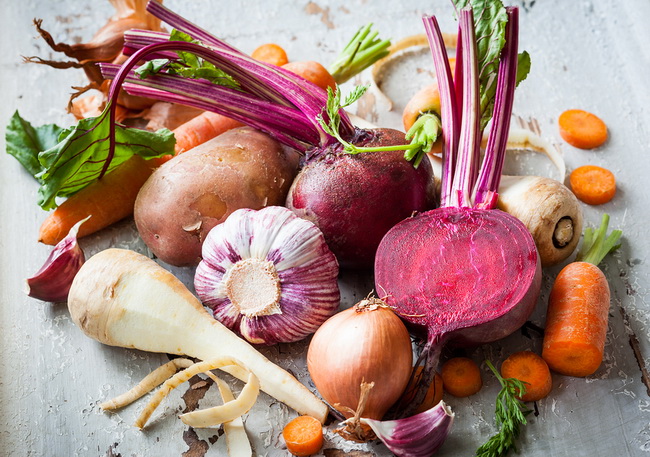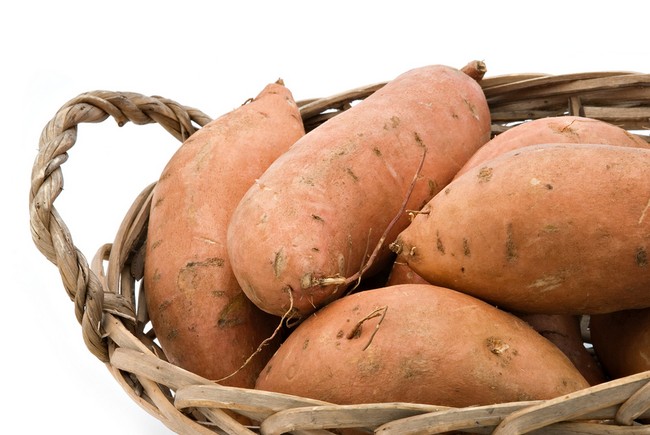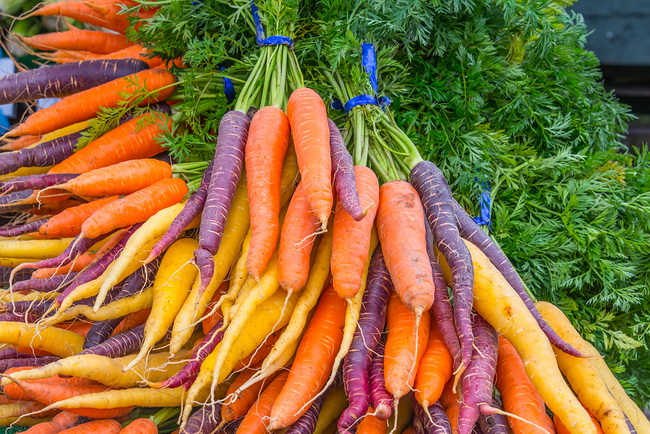- Make It Yourself Lavender Heart-Shaped Bath Bombs!
- 20 Things You Never Knew About “Down There”
- 12 Best Foods For Those Suffering From Arthritis Pain
- 12 Personal Hygiene Mistakes Almost Everyone Makes (Mom Never Told You About #4!)
- 15 Medicinal Plants And Herbs From The Cherokee People
- 12 Mind-Blowing Benefits Of Drinking Coconut Water During Pregnancy
- 12 Outstanding Winter Foods That Won’t Fatten You Up Like A Christmas Turkey
Get All the Dirt about Why You Should Eat More Roots

Photo credit: bigstock.com
Well, as you might imagine, root vegetables are exactly what the name says: vegetables that grow under the ground. You probably eat root vegetables everyday but never really think about them that way: sweet potatoes, carrots, onions, garlic, beets, parsnips, and turnips. Although you probably think of these as diet staples, these vegetables are just as important as spinach or broccoli because they really absorb minerals and vitamins from the earth. Almost all of them are high in vitamin C, vitamin A, B vitamins, as well as a good assortment of antioxidants.
First off, always choose organic because even though these veggies are below ground, they absorb all the pesticides through the water that washes off the pesticides and goes into the ground.
Always choose firm, blemish free root vegetables. If the tops are still attached, be sure that they are fresh looking and don’t have mildew.
In the past, most houses had root cellars for storing vegetables; a dark, cool, humid space. Most people day lack that type of storage. Place root vegetables in the refrigerator and seal them in plastic or paper and put them in the vegetable bin. Put onions and potatoes (except for green onions and shallots) in a mesh container in a cool cabinet.
Now that you know how to best choose and store them, let’s look at the reasons why you should be eating more of them.
Root vegetables can reduce your risk of cancer. One study, published in the Journal of Agricultural and Food Chemistry showed that raw carrots reduced the risk of developing cancer in studies done with rats.
Adding some root veggies to your meals and you can get important B vitamins, such as folates. This is super important if you are pregnant or trying to become pregnant as folates prevent neural tube defects.
Try adding some turnips or potatoes to your next soup, stew, or curry and get more vitamin C, along with other powerful antioxidants that can help your body absorb more iron.
Let’s not forget about the beta-carotene in carrots and sweet potatoes. Your body converts beta-carotene into vitamin A, which is important for your skin, eyes, bones, and regulation of your immune system.
Root vegetables are complex carbs, which breakdown slowly into sugar in the body. That gives you energy and the ability to function properly all day. They are also high in fiber and phytonutrients while most of them are very low in calories. With all these important vitamins and minerals, root vegetables improve your physical, as well as your mental health. Eating more root vegetables can even help you lose weight as their high fiber content helps to satisfy your craving for junk food. The fiber will also help keep your digestive system feeling fuller for longer periods of time, and clean out excess waste, which will increase your energy levels, making exercise easier.
Here are a few of the best root vegetables that you should be adding to your diet as often as possible.
Continue to Page 2

Photo credit: bigstock.com
1. Sweet Potatoes
Did you know that there are more than 400 varieties of sweet potatoes? They can be white, yellow, orange, cream, pink, or even purple! Sweet potatoes have super anti-inflammatory and antioxidant compounds and help to keep blood sugar levels stable.
You can even eat the leaves of sweet potato plants. These, too, have powerful antioxidant properties and are often added to soups. If you can find them, purple sweet potatoes contain more than 3 times the antioxidant power of blueberries. They contain high levels of vitamin C, phosphorus, manganese, copper, potassium, B vitamins and pantothenic acid.
2. Beets
Beets are especially good for your eyes and the nervous system of the body. They have antioxidants and anti-inflammatory compounds, and they also provide detox for the body. Beets help prevent heart disease and cancer. The fiber that beets can provide is especially good for your digestive tract.
Even beet juice is good for you and can help you exercise longer, according to a study published in 2009 in the Journal of Applied Physiology. Eight male subjects drank two cups of beet juice every day for six days. Researchers found that the men were able to ride bicycles up to 16 percent longer than they could before they began drinking the beet juice. This study shows that the nitrate content in beet juice leads to an improved use of oxygen in the body.
3. Potatoes
This is the number one food crop grown throughout the world. Potatoes are super nutritious as long as we aren’t making them in to French fries or piling on the butter and sour cream! Potatoes are a terrific source of vitamin B6, vitamin C, potassium, manganese, niacin, phosphorus, copper, pantothenic acid, and antioxidants.
Continue to Page 3

Photo credit: bigstock.com
4. Carrots
Like sweet potatoes, carrots can come in a variety of colors. Most of us are only familiar with the orange variety, but they also come in yellow, red, purple, even white.
You probably grew up watching Bugs Bunny eat carrots for good eyesight and he was right! They provide us with powerful protection from cataracts and glaucoma. Recent studies show that they can also prevent heart disease and colon cancer. Carrots are a great way to get your B vitamins, vitamin C, vitamin E, vitamin K, potassium manganese, vitamin A, and beta-carotene.
SEE ALSO: Top 5 Shocking Things You Never Knew about Your Food
5. Onions
All types of onions support a healthy cardiovascular system. They also increase bone density, support the ligaments, and have anti-inflammatory and anti-bacterial compounds. There have been numerous studies linking onions to cancer prevention. Studies done involving rats show that onions can help to balance blood sugar levels. They are a very good source of biotin, vitamin C, copper, B6, B1, phosphorous, folate, and potassium.
Onions can prevent blood from clotting and helps to lower your cholesterol levels. Adding more onions to your diet can help prevent heart disease, heart attacks, and stroke.
6. Garlic
Garlic is the all-star in this group of root vegetables. It’s antibacterial, antifungal, anti-viral, and anti-inflammatory. Garlic has a long history of medicinal use. Among its many benefits are cardiovascular health and cancer prevention. Garlic is a great source of vitamin B6, manganese, vitamin C, copper, selenium, B1, and calcium. Try to eat at least one or two cloves of garlic every day for your best health.
Sources:
































